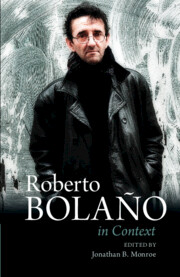Book contents
- Roberto Bolaño in Context
- Roberto Bolaño in Context
- Copyright page
- Contents
- Contributors
- Chronology
- Part I Geographical, Social, and Historical Contexts
- Part II Shaping Events and Literary History
- Chapter 9 France, Spain, 1938
- Chapter 10 The Cold War
- Chapter 11 After the Fall of the Wall: 1989–2001
- Chapter 12 Latin American Literature
- Chapter 13 French Connections
- Chapter 14 German and Russian Precursors
- Chapter 15 After the Two 9/11s: Santiago, 1973, New York, 2001
- Part III Genres, Discourses, Media
- Part IV Aesthetics, Culture, and Politics
- Further Reading
- Index
Chapter 12 - Latin American Literature
from Part II - Shaping Events and Literary History
Published online by Cambridge University Press: 15 December 2022
- Roberto Bolaño in Context
- Roberto Bolaño in Context
- Copyright page
- Contents
- Contributors
- Chronology
- Part I Geographical, Social, and Historical Contexts
- Part II Shaping Events and Literary History
- Chapter 9 France, Spain, 1938
- Chapter 10 The Cold War
- Chapter 11 After the Fall of the Wall: 1989–2001
- Chapter 12 Latin American Literature
- Chapter 13 French Connections
- Chapter 14 German and Russian Precursors
- Chapter 15 After the Two 9/11s: Santiago, 1973, New York, 2001
- Part III Genres, Discourses, Media
- Part IV Aesthetics, Culture, and Politics
- Further Reading
- Index
Summary
By sheer transgression, Roberto Bolano remapped the Latin American literary canon. Through novels, stories, essays, poems, and interviews, he did it by establishing a dialogue – often rapturous, seldom terse – with the major figures of 20th-century literature. Borges was his center of gravity. He admired Nicanor Parra and Cesar Vallejo. He found Isabel Allende kitschy. Gabriel Garcia Marquez was a merchant of stereotypes and Mario Vargas Llosa, while obviously talented, was in his eyes too professional. He ridiculed Diamela Eltit and plotted to kidnap Octavio Paz. Beyond his affinities, though, Bolano’s oeuvre reads like a who’s who of the continent’s literati. He wasn’t afraid to use fiction to do criticism and vice versa. His spontaneity is a lesson against academic posturing and lazy thinking.
Keywords
- Type
- Chapter
- Information
- Roberto Bolaño In Context , pp. 134 - 141Publisher: Cambridge University PressPrint publication year: 2023

